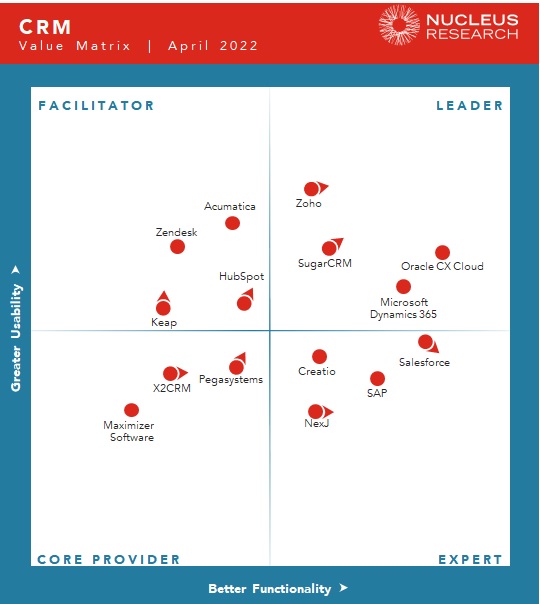Choosing the right CRM system can be tricky, and its easy to get lost on the way. We delve into some of the reasons why. 1) Too much choice
1) Too much choice
Firstly one of the biggest challenges is that there are so many CRMs to choose from. Nucleus are a leading research organisation and they released their latest 'CRM value matrix' and an accompanying report in April 2022, here. Their matrix (below) ranks some of the leading names in CRMs for usability and functionality. There are 15 CRMs in their matrix just for starters, including names you'll have heard of but a bunch of names you surely haven't.

2) Trade offs between usability and functionality
The implication of the matrix is that many CRMs involve a trade off between functionality and usability. You can always pay top dollar for a CRM that offers the best of both, but many businesses will have a keen eye on costs and ROI, meaning that just buying the best isn't an option.
Interestingly the same study by Nucleus Research found that "over the last year there has been an industry-wide shift towards prioritizing usability over functionality. The gaps in functionality that once existed between vendors are shrinking, and top players are instead focusing on reducing overall complexity and providing a highly intuitive user experience."
One of the reasons choosing a CRM is difficult in our opinion is that usability should always be prioritised above functionality - after all, if your users find your system frustrating to use, they won't be incentivised to use it, at which point it fails to matter what functionality it offers.
3) Picking a CRM that’s right sized for you and your business.
Many CRM solutions including those listed in the value matrix above, try to provide businesses with every extra feature conceivable to give the illusion that the platform can do more than others. In turn, this drives up the cost and complexity of the solution with functionality that small to medium-sized organizations rarely need.
Some CRMs therefore bring the essential functions of a CRM solution into a simplified and easy to use platform which was more specifically targeted at SME businesses.
An example CRM that is specifically aimed at the SME market is Pipedrive. Pipedrive has won numerous awards and was praised by Nucleus as a strong offering for SMEs.
Some of the CRMs listed in Nucleus's value matrix may well have a compelling SME offering, but it is by no means certain. Many SME businesses looking for a CRM could easily end up developing a short list of CRM options that were mostly suited to larger enterprises.
4) Establishing Total Cost of Ownership
The next challenge to choosing the right CRM is simply understanding how much it will cost you and particularly the Total Cost of Ownership (TCO). Opaque pricing structures are hugely prevalent in the CRM sector, making cost comparisons very difficult. 
You may find hidden one off and mandatory setup fees. You may see stepped charges that increase as the number of contacts in your CRM goes above certain thresholds.
All of this complexity impacts your ability to write a business case and calculate ROI and understand the actual costs you’ll be paying. For example a leading CRM player we looked at recently seemed to have 20-40 different modules or packages with each module or package having multiple sub-options.
Without understanding your use cases both now, and in the medium term, it can be very hard to make clear cost comparisons on a like for like basis, between different CRMs.
5) Understanding which functional areas you want your CRM to help with
Another factor that complicates the choice of CRM is that most CRMs can cover three significant domains within your business - not just sales and pipeline management, but also digital marketing (email marketing, automation, website content management, website landing pages, social media integrations, search engine optimisation (SEO) etc); and customer service and support (ticketing and call or case management, self service etc).
Different CRMs can excel in different domains so choosing the right one can depend significantly on which domain is the priority for your business.
6) Integration with your existing architecture
Most businesses aren’t greenfield CRM implementations and so they will have existing customer systems and data sources and so some consideration will need to be given to ensuring the CRM you choose will integrate easily with your existing architecture. Most modern CRMs should come with good API support - APIs allow for easier integrations to be developed. However there will still be some development overhead to build the integrations and your source systems may not be as easy to integrate to. Integration requirements can increase cost and complexity and again make an objective cost comparison between CRMs difficult.
7) Choosing the right partner
And finally the partner – you’re not just choosing a system but you’re also embarking on a new relationship with a partner that should span the next 10 years or more if you choose correctly. You need to have confidence that the partner has the right focus on customer service, the right capabilities to grow and evolve as your business grows and evolves.
What next?
So we've highlighted some of the many challenges that come with choosing the right CRM for your business and its probably feeling quite daunting right now. But fear not, with the right preparation and approach, you can give yourself the best chance of getting it right. We cover in our next blog how to go through a structured approach to choosing a CRM.